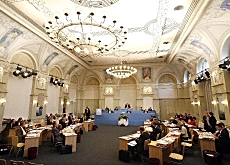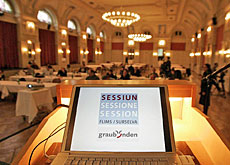Parliament pays tribute to Romansh

At the opening session of parliament in Flims in southeastern Switzerland speakers have called for greater focus on the issues facing the minority language region.
In Monday’s opening session, during debate on revision of the invalidity insurance scheme, parliamentarians decided not to index benefits paid abroad.
It is only the third time in the history of modern-day Switzerland that a parliamentary session is taking place outside the capital Bern.
The three-week meeting is being held at the mountain resort of Flims in canton Graubünden where the minority language Romansh is spoken alongside German and Italian. In 1993 politicians met in French-speaking Geneva and in 2001 in Italian-speaking Lugano.
Speaker of the House of Representatives Claude Janiak, who opened the meeting speaking in Romansh, German and Italian, congratulated parliament on the move and its interest in Romansh language and culture, but urged it to do more.
“Parliament cannot simply sing the praises of Switzerland’s four national languages; people also have to remember that national cohesion requires action,” said Janiak.
External
In his opening speech, Interior Minister Pascal Couchepin also shared his pleasure at holding the parliamentary session outside the capital, while echoing Janiak’s comments.
“Switzerland wants to make sure all minorities have the chance to be heard. Parliament should therefore seize this opportunity to properly familiarise itself with the problems facing external regions,” said the interior minister.
“In Switzerland it is impossible to find solutions unless you start to understand other people’s problems. But this should never be an excuse for maintaining the status quo or refusing change,” said Couchepin.
Claudio Lardi, a member of the Graubünden cantonal government also described the autumn session in Flims as a political and tourist highlight for the canton.
The primary reasons for the current session to be held outside the capital are major renovation work underway at the parliament building in Bern and a decision to pay tribute to the country’s fourth language.
In today’s opening session, parliamentarians decided that the invalidity benefit of Swiss abroad would not be indexed to local purchasing power.
The Senate also gave the green light to a credit worth SFr1.5 billion ($1.19 billion) for arms purchases as part of the army’s 2006 armament programme, despite opposition from left-wing parties. The figure has still to be approved by the House of Representatives, however.
The three-week meeting is focusing on a wide range of issues including army reforms, health, energy and taxes, as well as foreign affairs.
swissinfo with agencies

More
Multilingualism
Flims is a mountain resort in southeastern Switzerland with a population of about 2,800.
The village is a mixed-region where both Swiss-German dialect and the Sursilvan dialect of the minority language Romansh are spoken.
The session takes place in a luxury hotel compound which has been converted into house assembly rooms for the two parliamentary chambers.
Estimated costs for the event: SFr1.9 million ($1.5 million) funded jointly by the federal, cantonal and local authorities as well as private sponsors. The federal authorities for their part earmarked SFr1.7 million the session.
The Swiss parliament normally meets four times a year for a three-week session in the capital, Bern.
Until 1848, the founding of modern-day Switzerland, the cantons used to take turns to host the assembly. The spa at Baden, between Zurich and Bern, was one of the most popular venues.
The Swiss parliament is made up of two chambers which have equal powers.

In compliance with the JTI standards
More: SWI swissinfo.ch certified by the Journalism Trust Initiative


You can find an overview of ongoing debates with our journalists here . Please join us!
If you want to start a conversation about a topic raised in this article or want to report factual errors, email us at english@swissinfo.ch.